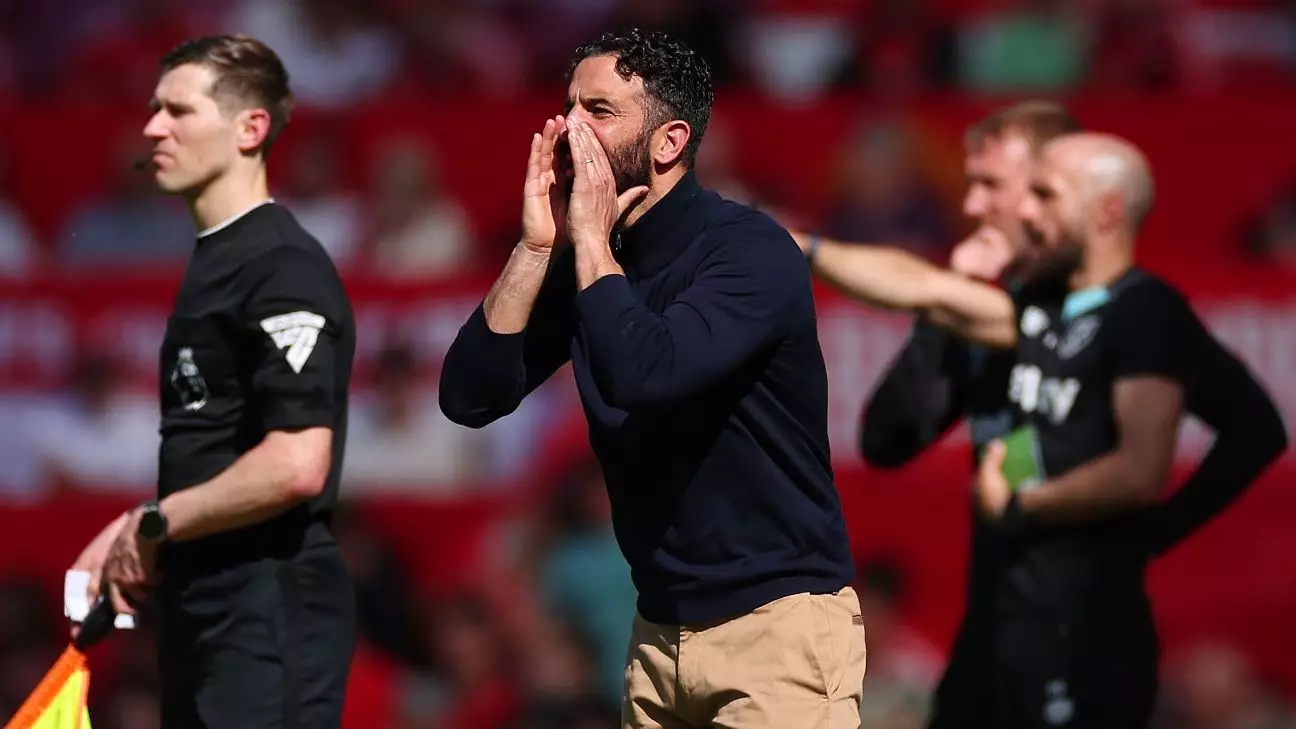The recent 2-0 loss to West Ham at Old Trafford has intensified scrutiny on Manchester United’s head coach, Ruben Amorim. With this defeat marking the 17th league game of the season without a satisfactory performance, Amorim is now acutely aware that his position is precarious at best. His post-match demeanor revealed an embarrassment that resonates not only with him but also with a fanbase accustomed to success. As United languishes in 16th place—the lowest league standing since their relegation in 1974—the pressure is mounting for Amorim to deliver results that justify his role at a club historically known for excellence.
Amorim’s raw honesty during his post-match interview reflects a worrying sentiment in the dressing room—a lack of urgency and a disconcerting acceptance of mediocrity. “How is a manager of Manchester United supposed to feel in this position? Embarrassed and it’s hard to accept,” he stated, underscoring that his concerns are not only tactical but also psychological. This admission shines a light on a deeper malaise within the club, as players seem unfazed by their troubling league status. Such apathy is alarming for a team that prides itself on fierce competition and a winning mentality.
The Fight for Identity and Culture
Amorim pointedly avoided branding the squad’s issues as purely cultural. Instead, he focused on the “feeling” permeating through the ranks. This distinction is significant; it suggests that the roots of the problem may lie in an emotional disconnect from the club’s storied past. The sense of urgency that once defined Manchester United has waned, prompting questions about the players’ commitment to restoring the club’s pride. “I have that feeling, that lack of urgency in everything we do. It’s a big concern,” Amorim stressed, indicating that this sentiment must shift rapidly if progress is to be made.
From an analytical standpoint, one must wonder if this lack of urgency is symptomatic of broader issues involving management, age, and the mentality instilled in the squad. Can Amorim instigate the transformation needed, or is the malaise too deeply entrenched? The expectation is that managers, especially ones at historic clubs like Manchester United, not only coach but also serve as emotional leaders, rekindling the fire that fans associate with glory. It raises fundamental questions about the efficacy of the current training regimes and whether they adequately prepare players both mentally and physically.
Future Uncertain Amidst an Era of Transition
Despite guiding United to the Europa League final—a commendable achievement—Amorim’s league record is disheartening, with just six victories since taking the reins in November. He is under contract until 2027, yet both he and supporters seem to acknowledge that without prompt improvement, his tenure could be fleeting. His candid approach reveals that he is acutely aware of the implications of continued poor performances: “We need to be really strong in the summer and be brave,” he emphasized, hinting that decisive action may be needed regarding personnel.
The immediate horizon offers little respite, with critical games against Chelsea and Tottenham looming. The upcoming fixtures bear significant weight—not only for their league implications but also for the emotional state of the squad as they approach a crucial Europa League final. Amorim’s comments suggest a profound realization: “We are showing at the end of the season that playing in the Premier League and Champions League for us is the moon.” The gravity of this statement cannot be overstated; it encapsulates the expectations of what Manchester United should represent versus the brutal reality they currently face.
With so much at stake, the Manchester United board must weigh the cost of maintaining a manager lacking the necessary results against the potential rewards of investing in changes that could restore the club to its former glory. It is a crossroads moment for Amorim and Manchester United, adding layers of complexity to an already challenging situation. Whether he can instigate a revival or if a more drastic shift is required remains the central question that will define United’s next chapter.

